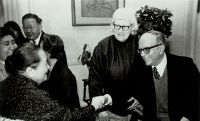Israel Epstein
Israel Epstein (艾培 Apr. 20, 1915-May 26, 2005) is a Polish-born Chinese citizen, who spent most of his life bridging communications between China and the western world.
Known as a prominent journalist and author, Epstein was born into a jewish family in Poland and moved to China with his parents when he was very young. He was educated by his parents who instilled a strong sense of equality towards all people into him. He carried this compassionate demeanor with him into adulthood, which also explains his sympathy for China’s revolution.
In 1931, he became a reporter for the Peking Tientsin Times, an English newspaper set up by British architect William Bellingham in the former British Concession of Tianjin. Six years later, he became one of the journalists working for the prestigious Associated Press in the U.S.
Around 1933, Epstein met Edgar Snow, who would go on to become one of the most important figures in his life, when he was assigned to write a critique on the U.S. journalist’s publication "Far Eastern Front". He took a weekend away from Tianjin to Beijing to visit Snow who was at the time teaching Journalism at Yenching University. The two soon became friends.
In 1936, Snow paid a secret visit to the Red Army garrisoned in northwestern China under the liaison of Soong Ching-ling. He then finished his prestigious work "Red Star over China", which provided the world with a view on China’s guerrilla forces and the related rural life. Epstein was among those who read Snow’s manuscript of the documentary before it was actually published.
Epstein had been the correspondent for the United Press International (UPI) in covering the Anti-Japanese-Aggression War (1937-1945) in China and for this had been traveling across Shanghai, Nanjing, Wuhan and Guangzhou since 1937. He covered a story on the Battle of Tai’erzhuang, a major Kuomintang victory over the Japanese invaders, by coming onto the frontlines. In 1939, he published his first book—"People’s War"—in London, introducing the Chinese people’s fight against the Japanese militarists during the first two years of the war.
In 1938, he met Soong, known as the widowed Madam Sun Yat-sen in a patriotic parade in Guangzhou and thus ushered in their decades-long friendship. He then joined Soong as one of her foreign friends in China Defense League, a Hong Kong-based international unity organization providing medical aid and international communication in the middle of the anti-fascist war. He was responsible for the publication of the league’s biweekly English magazine.
The year 1944 meant a turning point in Epstein’s life. It was then that he joined the overseas journalistic group to visit the anti-Japanese troops in northwestern China led by the Communist Party of China (CPC). He was then made acquaintance with the early CPC leaders, including, Mao Zedong, Zhu De and Zhou Enlai, on behalf of the American publications, including United Labor News (Chinese: 联合劳动新闻), The New York Times, and Time Magazine. And his over a dozen reports on the CPC’s fight against the Japanese intruders filled up a vacuum in the prestigious newspapers’ stories on the Second World War.
From 1945 to 1951, Epstein and his wife Elsie Fairfax-Cholmeley were trying everything they could possibly think of to enhance the relationship between China and the U.S., in spite of Uncle Sam’s McCarthyism back in those days.
In 1951, the couple returned to China under the invitation of Soong to establish one of the country’s English magazines entitled "China Construction". Epstein later became the editor-in-chief of the magazine and "China Construction" is now a multi-language magazine renamed "China Today", which belongs to China International Publishing Group (CIPG).
As many of the literati, he fell victim to the Cultural Revolution (1967-1977) and was imprisoned for five years during the political turmoil.
But he was soon back to work after his release in 1973 and subsequently followed the changes of China and the world.
He was also an enthusiastic philanthropist, showing his ardent support for the Soong Chi-ling Foundation, a charity organization initiated by Soong during her lifetime. In 1992, he completed the biography of Soong entitled "Soong Chi-ling — in Memory of the Great Woman in the 20th Century", after Soong had passed away in 1981.
He died in 2005, a few months after the publication of his work "A Memoir of More than 80 Years in China".

